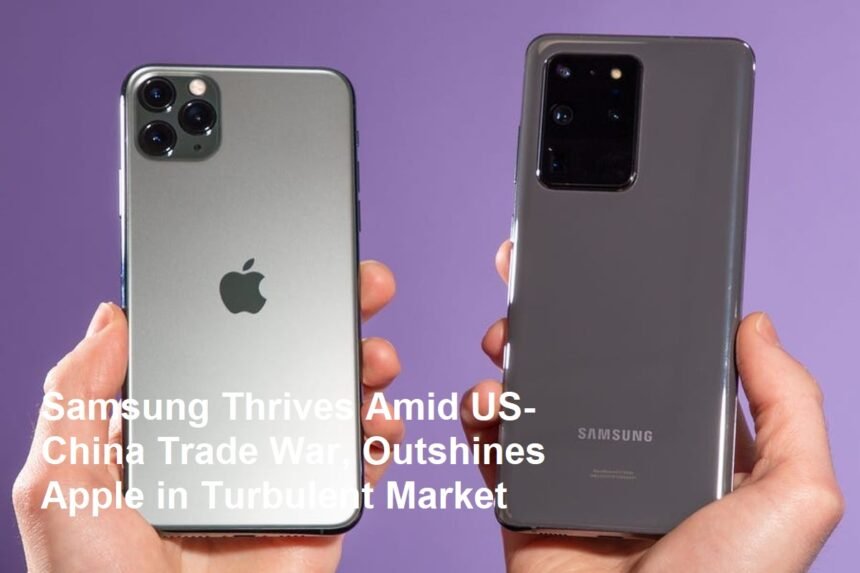As the US-China trade war reshapes global supply chains, South Korean tech giant Samsung Electronics has emerged as an unexpected winner, reporting robust profits in 2023 despite economic headwinds. Meanwhile, its rival Apple faces mounting challenges, including sluggish sales in China and production bottlenecks, highlighting a stark divergence in fortunes between the two tech titans. Analysts attribute Samsung’s resilience to its diversified manufacturing footprint and agility in navigating tariff disputes, while Apple’s heavy reliance on Chinese suppliers and markets leaves it increasingly vulnerable.
Trade War Fallout: A Tale of Two Strategies
The US-China trade conflict, reignited in recent years by tariffs on semiconductors, electronics, and critical components, has forced multinational firms to rethink their supply chains. Samsung, which began decentralizing production a decade ago, now operates factories in Vietnam, India, and South Korea, minimizing exposure to China. In contrast, Apple remains deeply entrenched in Chinese manufacturing, with over 90% of its products assembled there by contractors like Foxconn. This contrast has proven pivotal as geopolitical tensions escalate.
In 2023, the US expanded restrictions on advanced semiconductor exports to China, while Beijing retaliated with bans on American tech firms and tightened scrutiny over foreign manufacturers. Samsung, less dependent on either market for production, sidestepped the worst of these measures. Its semiconductor division, bolstered by demand for AI chips and memory solutions, saw Q3 profits jump 18% year-on-year to $4.6 billion. Meanwhile, Apple’s revenue in Greater China plummeted 12% in the same quarter, reflecting weakened consumer sentiment and rising competition from domestic brands like Huawei.
Samsung’s Supply Chain Agility Pays Off
Samsung’s strategic investments in Southeast Asia have insulated it from tariff-related disruptions. Since 2014, the company has poured $18 billion into Vietnam, which now accounts for 60% of its smartphone output. This shift allowed Samsung to avoid US tariffs targeting Chinese-made electronics, which can reach 25% for certain components. Additionally, India’s production-linked incentive (PLI) scheme for electronics manufacturers enabled Samsung to expand its Chennai plant, securing tariff exemptions on devices sold domestically and exported to Europe.
The company also capitalized on China’s tech slowdown. With Huawei constrained by US sanctions, Samsung regained ground in premium smartphone markets across Europe and Latin America. Its Galaxy S23 series, featuring chipsets produced in-house and in US-allied South Korea, faced no export restrictions, unlike Apple’s China-dependent iPhone 15.
Apple’s China Conundrum
Apple’s challenges underscore the risks of overreliance on a single region. Despite efforts to diversify—such as shifting some iPad production to Vietnam—the company remains tethered to China for iPhone assembly. Recent COVID-19 lockdowns in Zhengzhou, home to Foxconn’s largest iPhone factory, caused severe delays, costing Apple an estimated $6 billion in lost sales in late 2022.
Moreover, Beijing’s push for tech self-sufficiency has emboldened local rivals. Huawei’s surprise launch of the Mate 60 Pro, powered by a domestically produced 7nm chip, has reignited patriotic buying in China, eroding Apple’s market share. Concurrently, Chinese government agencies and state-owned enterprises have begun restricting iPhone use among employees, citing security concerns—a move interpreted as retaliation against US semiconductor curbs.
Semiconductor Supremacy: A Decisive Edge
Samsung’s vertically integrated supply chain, particularly in semiconductors, provides another advantage. As the world’s largest memory chipmaker, it supplies not only its own devices but also competitors, including Apple. The US-CHIPS Act, which allocates $52 billion to bolster American semiconductor production, has further benefited Samsung, which is expanding its Texas-based chip foundries. In contrast, Apple’s dependency on TSMC—whose advanced fabs are concentrated in Taiwan—exposes it to cross-strait tensions and potential supply shocks.
Market Reactions and Future Outlook
Investors have rewarded Samsung’s strategic positioning, with shares rising 24% in 2023 compared to Apple’s 7% gain. “Samsung’s ability to pivot amid geopolitical shifts is a masterclass in risk management,” said Lee Jae-yun, an analyst at Yuanta Securities Korea. “Apple must accelerate its diversification efforts or risk further erosion.”
Looking ahead, Samsung aims to leverage its lead in AI-driven devices and foldable smartphones, a niche where it dominates with 80% market share. Apple, meanwhile, is reportedly fast-tracking plans to move 25% of iPhone production to India by 2025, though analysts caution that replicating China’s scale and efficiency will take years.
Conclusion: Adaptation as the New Imperative
The US-China trade war has underscored a critical lesson for tech giants: flexibility is survival. Samsung’s proactive supply chain decentralization and semiconductor autonomy have positioned it to thrive in an era of fragmentation. For Apple, long-celebrated for its seamless integration, the path forward demands painful but necessary recalibration. As tariffs and tech cold wars redefine global trade, the ability to adapt—not just innovate—will separate the winners from the losers.









